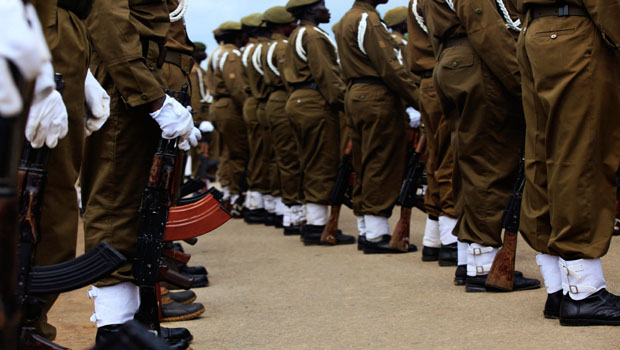
Sudan People’s Liberation Army (SPLA) soldiers stand during a parade on the 31st anniversary of the SPLA in Juba on May 16, 2014. (Reuters/Andreea Campeanu)
London, Asharq Al-Awsat—A senior South Sudanese Foreign Ministry official resigned on Tuesday over what he described as Juba’s “lack of sensitivity” towards the armed conflict between government forces and rebels that erupted late 2013. The latest round of talks between the South Sudan government and rebels loyal to Riek Machar was adjourned on Wednesday amid fears that ongoing efforts to secure a comprehensive ceasefire are failing.
In the first such resignation of a high-profile South Sudanese official, Juba’s deputy-ambassador to the UN Francis George Nazario said he was quitting his post in protest against the ongoing armed conflict between President Salva Kiir and his former vice-president, Riek Machar.
In comments to Asharq Al-Awsat following his resignation, Nazario said: “The national crisis has revealed the true mettle of the political elite [in Juba],” accusing the South Sudanese government of resorting to the use of force in dealing with its problems.
“After five months, the war is still raging, posing a threat to the country and driving it to the edge of the abyss,” Nazario said. He criticized the Juba government for “lacking the vision and methodology for managing the political, social and economic affairs” in the country.
The ongoing violence in South Sudan has taken an ethnic dimension, with supporters of Machar predominately belonging to the Nuer ethnic group and Kiir’s supporters belong to his own Dinka ethnic group. Nazario told Asharq Al-Awsat that the ethnic dimensions of the conflict were “systematically disrupting state institutions and undermining the rule of law and order.”
Nazario also criticized President Kiir’s government for “restricting public freedoms and disrespecting human rights,” citing cases of harassment, arrests and threats against journalists.
Corruption is entrenched in Juba to the point that it has curbed the government’s ability to provide the public with basic services, the former official said.
A new round of peace talks between the South Sudanese government and the rebels has been postponed, Agence France-Presse quoted mediators as saying on Wednesday, but there has been no information about the reason for the delay in the African Union (AU)-sponsored talks, which aim to end the armed conflict in South Sudan.
Meanwhile, clashes between government and rebel forces renewed in the oil-rich Unity and Upper Nile provinces on Tuesday. Juba accused rebels of violating the ceasefire agreement signed between Kiir and Machar in Addis Ababa last month.
Machar forces broke the May 9 ceasefire agreement after they attacked Bentiu on Tuesday, South Sudan’s Minister of Defense Kuol Manyang Juuk told Asharq Al-Awsat.
“Machar cannot control his forces,” Juuk said, expressing doubts whether the rebel leader truly “seeks to achieve peace as long as he thinks he can arrive to power through war.”
According to media reports, government and rebels representatives will instead attend a “symposium” at the AU headquarters on Thursday.
